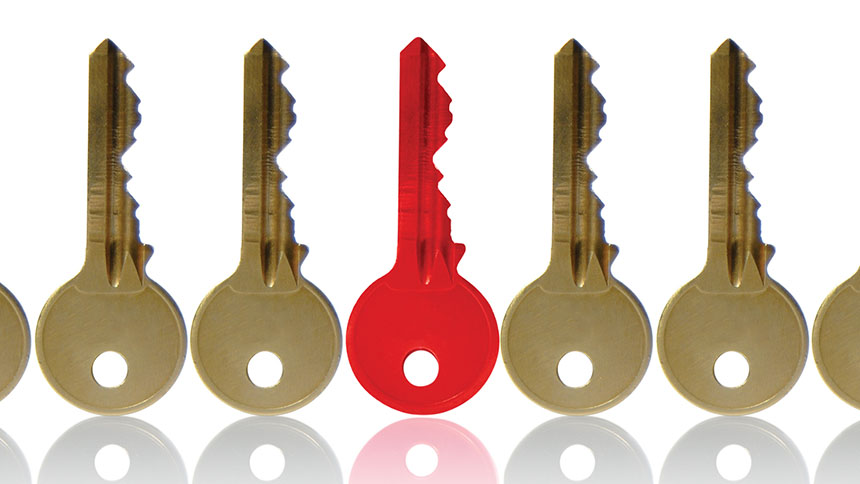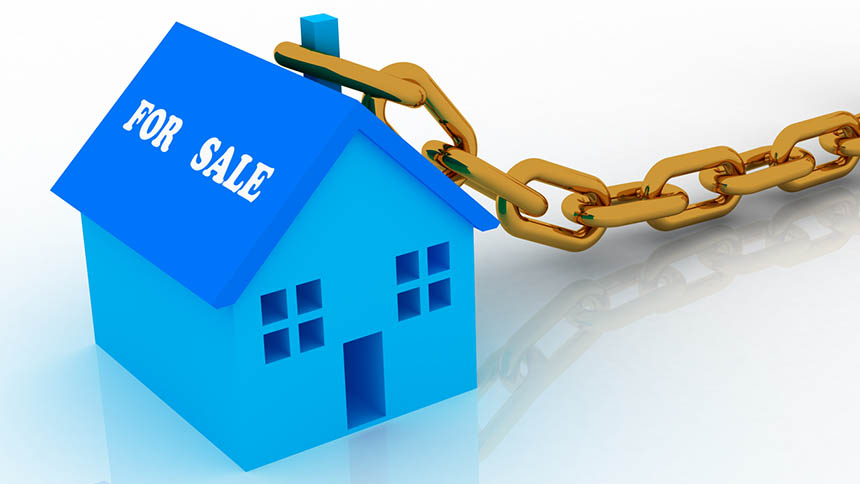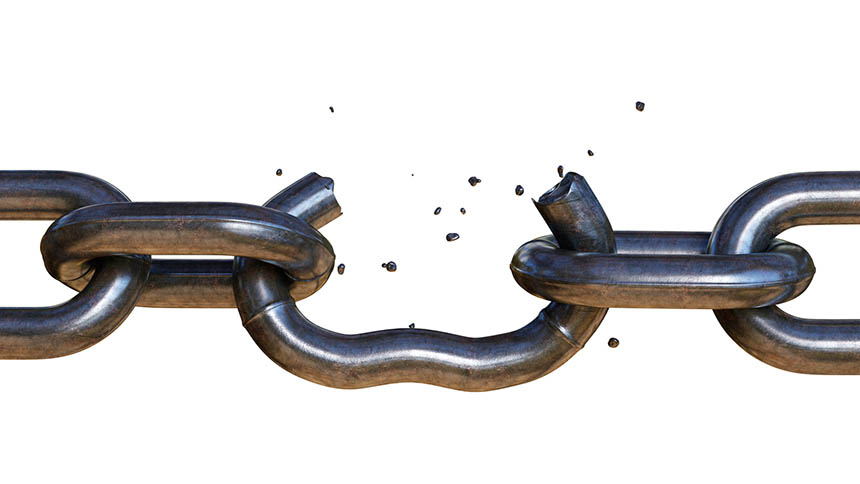Posted 21 November 2017 by
Keith OsborneBuying or selling a home as part of a property chain can make the process complicated and even put the transaction at risk. We talk you through what it involves, how to deal with it and how you might avoid it.
What is a property chain?
A property chain is the link between three or more buyers/sellers of homes where each relies on at least one of the others. Whoever is at the ‘start’ of the chain is only buying; whoever is at the end is only selling; but those in the middle (the ‘links’) are trying to coordinate the sale of their existing property and purchasing a new one.
The links don’t just involve the buyers and vendors though - each of them is likely to be working with estate agents, conveyancers, mortgage lenders and surveyors too, each of whom is relied upon to do their work to the timetable needed by their client.
The property chain will move at the speed of the slowest link, which is what makes it a precarious situation in which to move house.
How to buy a home in a property chain
 The people at the beginning and the end of a chain have fewer responsibilities one way or another, but for those in the middle, a successful move relies on several factors:
The people at the beginning and the end of a chain have fewer responsibilities one way or another, but for those in the middle, a successful move relies on several factors:
- Getting a mortgage agreed in principle
- Making an offer on their new homes and getting their current property sold subject to contract
- Arranging a solicitor/conveyancer
- Arranging surveys (legal and physical)
- Finalising the mortgage
- Exchanging contracts on purchase and sale
- Completing on purchase and sale
How many properties are in a chain?
There are no official figures to show how long the average or extreme chains are. It could be as low as three, while some online forums tell of situations of 10 or more links.
Research from estate agency Countrywide a couple of years ago showed the proportion of properties sold as part of a chain had sunk from 90% in 2005 to 67% in 2015.
What is the average length of a property chain?
There are no official figures to show how long the average chain is. It usually takes several weeks for all the elements to come together.
What is the longest house chain?
There are no official figures to show how long the longest chain is. Online forums have examples of ten or more properties involved sometimes.
What is a chain-free property?
A property is chain-free when neither the seller and buyer are relying on another purchase/sale in order to ensure this change of ownership happens.
There are very few circumstances when a property is chain-free. One example is when a homeowner buying a new build property does so under a Part Exchange deal with the housebuilder. In this case, these are the only two parties involved, and the deal means that they can work together to coordinate the timing of sale/purchase, with the purchaser able to remain in and move out of their existing property until the new one is ready.
Another example would be when buying a vacant property, for example a repossession or one that used to belong to someone who has died.
How to sell a home in a property chain
 The people at the beginning and the end of a chain have fewer responsibilities one way or another, but for those in the middle, a successful move relies on several factors:
The people at the beginning and the end of a chain have fewer responsibilities one way or another, but for those in the middle, a successful move relies on several factors:
- Getting a mortgage agreed in principle
- Making an offer on their new homes and getting their current property sold subject to contract
- Arranging a solicitor/conveyancer
- Arranging surveys (legal and physical)
- Finalising the mortgage
- Exchanging contracts on purchase and sale
- Completing on purchase and sale
If you’re only selling a property, the process would be considered chain-free if, for example, it was being sold to a first-time buyer, or the purchaser was an investor not planning to live in the property themselves and not reliant on a mortgage or time scale.
How to manage a property chain
One way to minimise the chance of problems later on is to make a few enquiries into your potential buyer and seller at an early stage. Try to establish if the vendor already has another property lined up to purchase, and whether their financial and legal situation has been set up. If you can, set up some time limits on processes, for example limiting the period between exchange of contracts and completion to a maximum of two weeks.
Though you’ll never be able to truly control a whole property chain yourself, there are a few things you can do to minimise your part of it having a bad effect on the whole chain.
- Be honest about your financial position to minimise problems with your mortgage lender. The best thing to do is to secure your finance in principle before you start your property search, so you know exactly where you stand.
- Choose the best conveyancer/solicitor, one who you can rely on to contact you when it is necessary and keep you informed about the process as it goes on.
- Put your property on sale at a realistic price. An inflated asking price is unlikely to attract much positive attention, let alone secure a buyer.
- Be honest about problems with your home, as a survey is very likely to soon find out things that you may have tried to conceal.
What to do if a property chain breaks/collapses
 According to a survey by Which? in 2016, around three out of ten property purchases collapse, at an average cost of nearly £3,000 to each buyer, and with one failing link risking the collapse of the whole property chain, it’s a major consideration.
According to a survey by Which? in 2016, around three out of ten property purchases collapse, at an average cost of nearly £3,000 to each buyer, and with one failing link risking the collapse of the whole property chain, it’s a major consideration.
The breaking of the chain can be due to a variety of reasons: a survey showing serious problems with the property; the buyer being unable to get the finance they need; the buyer or seller changing their minds about what they are doing; one of those parties falling ill or their relationship with a partner breaking down; one of the legal companies involved taking too long in their part of the procedure.
If you find the chain has broken at your ‘link’, there may be something you can do to retrieve the situation:
- If the person you’re buying from pulls out, check with estate agents right away about other properties that may interest you so that you can keep your sale going.
- If the person buying from you pulls out, make a point of letting the chain know. Try to find out why they pulled out - if it’s based on finances, you may have a chance to reduce your asking price if you want, in order to keep things going.
- If your buyer is delaying things even after exchange of contracts, send them a ‘notice to complete’, which sets a deadline of ten days and means they’re likely to lose their deposit if they delay things further.
- There are companies that offer a ‘chain-free’ purchase of your home to guarantee things from that direction, though they will usually offer a price notably less than the market value. It’s up to you to decide whether the certainty of selling your home is worth that financial cost.
- As a last resort, consider a bridging loan, which although expensive, would see you through any subsequent delays before your sale/purchase are completed.
How to break a property chain
Being stuck in a volatile property chain really puts your own link in it at risk. So should you consider breaking the chain yourself, and how would you make that happen?
Losing a purchase and/or sale through a property chain breaking can cost thousands of pounds, and there are several reasons for avoiding a property chain if you can:
- You’ll be in a stronger buying position if the vendor knows you’re not relying on a sale of your own property to conclude your purchase of theirs.
- Your purchase becomes more predictable if you’re not relying on things outside of your control, so you’re much less likely to lose money due to the actions or inactions of people you don’t know and have no influence on.
- ‘Gazumping’ becomes less likely, because a seller is unlikely to belatedly reject a reasonable offer from you if he/she risks taking a higher price from someone else, who is relying on a property chain.
- Buying a home not in a property chain has piece-of-mind advantages when it comes to the mortgage finance.
There are three main ways you can break the housing chain:
- Sell before you buy - you won’t need to compromise on time or price to keep your simultaneous purchase going, and the person you eventually buy from may reduce their price for the advantage of selling to chain-free you.
- Get a bridging loan - though not cheap, this kind of loan will let you buy the home you want. However, if the sale of your place takes time, the repayment can be expensive over time.
- Extend your current mortgage - by borrowing more money on your current home, you can contribute more to the deposit of your new one and have the opportunity either to rent your property out to meet the mortgage payment on it, or to just sell it at you own pace and use some of the profit on the sale to pay of a chunk of the new mortgage.
How to avoid getting in a chain
With the risks and uncertainties involved, particularly in long property chains, it may be an advantage to you to avoid one altogether, and there are several ways to eliminate or shorten your property chain:
- If you have a number of people keen to buy your home, opt for one who won’t be in a chain themselves, eg an investor and first-time buyer.
- Consider selling up and then moving in temporarily with family/friends or into short-term rented accommodation, in order to make yourself chain-free when buying in the near future.
- Go for buying a new build home, as there is no upward chain and you may have the option of Part Exchange that will rid you of a sales chain and perhaps speed up the new build purchase process.
- Only consider buying properties that aren’t in a chain, eg a repossession, a ‘second home’ that is not a main residence or a property where the previous owner has died.
- Get the vendor of the property you’re buying to firmly agree a moving out date whether or not that requires them to prepare themselves for short-term rental accommodation.
If you're in a hurry, try to get the vendor of the property you're buying to agree to a date by which they are prepared to move out, whether they've bought somewhere themselves or not. Vendors will sometimes agree to move into rented accommodation to avoid risking the deal falling through.